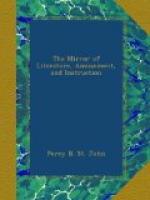The exterior of the “Colosseum” (of the interior of which building our last Number contained a description) was intended for the embellishment of the present Number. Our engraver promised—but, as Tillotson quotes in one of his sermons, “promises and pie-crusts,” &c. The engraving is, however, intended for our next mirror, with some additional particulars of the interior, &c.
* * * * *
SEVERE FROST.
(For the Mirror.)
On the 25th of December, 1749, a most severe frost commenced; it continued without intermission for several weeks, during which time the people, especially the working classes, experienced dreadful hardships. Many travellers were frozen to death in coaches, and even foot passengers, in the streets of London, shared the same fate. Numerous ships, barges, and boats, were sunk by the furious driving of the ice in the Thames. Great were the distresses of the poor, and even those who possessed all the comforts of life, confined themselves within doors, for fear of being frozen if they ventured abroad.
The watermen of the river received great assistance from merchants, and other gentlemen of the Royal Exchange; but the fishermen, gardeners, bricklayers, and others, were reduced to a miserable extremity. These poor men, presenting a sad aspect, assembled to the number of several hundreds, and marched through the principal streets of the metropolis, begging for bread and clothing. The fishermen carried a boat in mourning, and the unfortunate mechanics exhibited their implements and utensils. The citizens of London contributed largely to their relief, as did most of the inhabitants of the main streets through which the melancholy procession passed.
G.W.N.
* * * * *
OTWAY, THE POET.
(To the Editor of the Mirror.)
Any anecdote relating to, or illustrative of, the works of this great man is a public benefaction; and I, in common with all your readers, (no doubt,) feel obliged to your correspondent for his history of Charles Brandon, Duke of Suffolk; at least, so much of it as, it would seem, was connected with the tragedy of the Orphan. Charles Brandon was, as history informs us, a gay, young, rattling fellow, a constant exhibitant at all tilts and tournaments at Whitehall and elsewhere; courageous, “wittie and of goodlie persone,” in fact, a regular dandy of bygone days, a fine gallant, and of course a great favourite of his royal master; but, notwithstanding all this, it is not clear to me that Charles Brandon and his brother were the romantic originals of Polydore and Castalio. I rather think, if Otway did form his characters on any real occurrence of the sort, the distressing event must be laid to the noble family now proprietors of Woburn.




